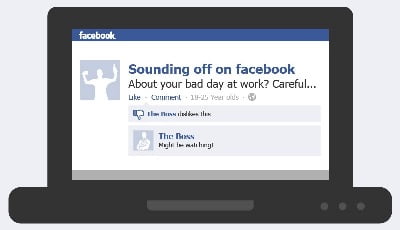New research has shown that nearly a third of all 18-25 year olds globally are Facebook friends with their boss, though over half have never done an audit on their profile to clean-up posts that could lead to career suicide. It’s a tricky situation – friending your boss means you have to carefully monitor the things you say, but ignoring their request could seem rude.
By Chloe Schneider
According to the AVG study titled Digital Baggage, Aussie’s haven’t quite worked out how to solve this dilemma. Sixty-two per cent of Australian young adults who are Facebook friends with their colleagues do not restrict what those co-workers can access but one in ten admitted to posting abusive content online about their boss or company after a bad day at work. We spoke to AVG Technologies AU Security Adviser Michael McKinnon about how we can deal with some of the more awkward social media situations…

RESCU: It can be a little awkward turning down a Facebook request from a colleague or boss. How can we do this without seeming rude?
Michael McKinnon: “Will you be my friend?” – it’s a question and concept that we‘ve all experimented with as children, and one we have all grown up forming our own understanding (and sometimes trauma) about – and I think it’s fair to say that none of us like being rejected.
In my view, when it comes to Social Media, however, the stakes are quite high, because it’s not just about being someone’s friend. An invitation to connect on Facebook, for example, is a subscription to an ongoing stream of sometimes very private information.
As to the dilemma of “seeming rude”, fortunately there are many ways to achieve this:
- Facebook gives you the option to ignore friend requests – there’s usually a “Not Now” button you can click that will hide unwanted friend requests, so unless the person wanting to be your friend is directly hassling you about it, there’s no obligation to become someone’s friend if you don’t want to.
- Don’t be bullied into connecting with anyone – if a person is resorting to bullying you into being friends, this should be a loud enough signal to realise it won’t be worth the hassle; and you can even report them to Facebook if you need to. I also think it’s always best to keep talking to trusted friends about how to deal with a situation like this, and never keep it to yourself.
- Lock down your profile, big time – did you know you can set your Facebook so only you can see who your friends are? I have my Facebook setup like this (my friends are visible to “only me”), and it has allowed me to avoid issues of some of my friends knowing who some of my other friends are (good for protecting celebrities!).
- Add them, but restrict them as well – Facebook has the ability to restrict certain friends from seeing your posts, but they’ll still think they’re friends with you. Be careful, though, if they’re friends with other friends who see all of your posts, your restricted friend may become suspicious.
- Stop accepting Friend requests – if all else fails, you can absolutely turn off the ability to accept friend requests. This way, it is always you that has to make the first move!
RESCU: What sort of things are the most damning on social media when it comes to our careers?
Michael McKinnon: In my experience, this is generally going to vary depending on the career path you want to follow.
For people following careers like perhaps sales, PR or marketing as an example, it’s possible that having lots of friends and an open profile with lots of jovial commentary will have you seen as someone who is a great networker and fun to be around. Nobody says Social Media needs to be damning to your career per se!
For others who may be chasing careers like in public service, defence or a police force, or perhaps working for a large corporate like a bank, it might be more appropriate to have a Social Media profile that is low key and closed off from public view.
In terms of content being posted on Social Media and the potential to be damning, there really are no limits, and damage can be done with text, photos and video content equally, either intentionally (a hard day at work, letting off steam) and sometimes unintentionally (one too many drinks out on the town).
RESCU: Do you have any tips on how to recover from a Facebook faux-pas? For example, if we do forget our boss is our friend and write a negative statement about work – should we address it or hope our boss doesn’t notice it?
Michael McKinnon: It’s the conundrum of “delete it” or “deal with it”. I’d say I’m really in two minds about this, and mostly it’s about timing. You really have to make an individual judgement call – and generally I’d err on the side of caution, so if you’re already thinking about the possibility of deleting something – you probably should!
Delete It? There is often a perception that once something is on the Internet it’s very hard to get rid of. But the reality for most of us is that this isn’t the case. Deleting something from Facebook and other Social Network sites can actually remove things permanently – provided nobody else has taken a copy and posted it elsewhere outside of your control!
Deal With It? If you’ve already had people comment on your faux-pas, try to gauge what their reactions have been. Are they telling you to remove it? There’s nothing wrong with being provocative sometimes to get a reaction, but you’ll need to decide if you’re up to dealing with the hassle of coordinating some damage control around it. That being said, I’ve seen some classic recoveries that have left people laughing, rather than crying. Social Media is just a reflection of humanity after all.
RESCU: How can parents teach their kids about these risks before they get a job?
Michael McKinnon: Parents, I believe, are well advised to continue teaching their children respect and manners, and common values that have always been taught and passed on from generation to generation.
Social Media should reflect our society; if we don’t like Social Media, perhaps we’re looking in the wrong place. The famous quote “with great power comes great responsibility” can be traced back in various forms over 2,000 years to Socrates. And it has never been truer to this day, than it is with Social Media.
The most important thing to remember is to carefully consider everything that goes online about you. If you wouldn’t want your boss, your brother, or your parents to see it – it might not be the best idea to put it up!


















